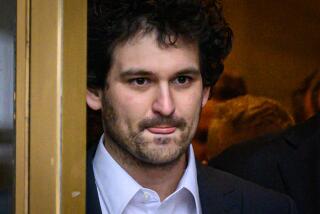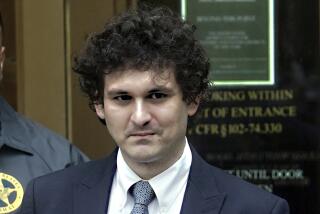Ex-Enron Chief Testifies He Saw No Warning Signs
- Share via
WASHINGTON — Former Enron Chief Executive Jeffrey K. Skilling testified Thursday that he heard no warnings and saw no hint of trouble last year as one of the nation’s largest corporations careened toward disaster.
While describing himself as “devastated and apologetic about what Enron has come to represent,” Skilling insisted before a House panel that the company was “solvent and highly profitable” when he resigned Aug. 14, only 3 1/2 months before the energy trader’s collapse.
Enron, he said, was destroyed by “a classic run on the bank,” a suggestion that the company was not ruined by its failure to disclose off-the-books partnerships whose losses helped trigger the Chapter 11 bankruptcy filing Dec. 2.
Skilling’s assertion that he never knew about improprieties and never approved certain partnership deals that involved conflicts of interest was met with skepticism and sarcasm by the House panel.
As for fellow executives who made personal fortunes in off-the-books transactions that contributed to the company’s demise, Skilling said he and others recognized the potential for conflicts of interest but thought that special safeguards instituted to prevent problems were working.
Skilling testified before the House Energy and Commerce subcommittee on oversight and investigations in an atmosphere rife with outrage. The hearing began at 10 a.m. and dragged on into the late afternoon. Nine Enron executives and directors, as well as two other witnesses, appeared before the panel.
Four senior Enron executives, including former Chief Financial Officer Andrew S. Fastow, invoked the 5th Amendment to avoid answering questions from the committee. Fastow played a lead role in engineering outside partnerships that created undisclosed financial vulnerability for Enron.
Subcommittee members vied with one another in denouncing the former executives amid whirring cameras and an audience of former Enron employees who lost their retirement savings.
“I hope you, in the dark night of your own souls, think about some of the people who . . . literally lost their entire life savings and whose lives effectively in many ways are destroyed because of your actions,” Rep. Peter Deutsch (D-Fla.) told four former Enron executives.
Congressional outrage appeared to be intensified by a sense of betrayal. Many members had received over the years Enron’s generosity as a campaign donor--and had approved changes in financial and accounting rules that helped open the way for its freewheeling business practices.
The Enron executives were variously described as “economic terrorists,” “business cowboys” and just plain “crooks.”
Enron filed for bankruptcy protection less than a month after it restated its earnings to account for previously unreported losses of $586 million during the previous 4 1/2 years. In mid-October, it disclosed a $1.2-billion reduction in shareholder equity, related in part to the secretive partnerships.
Enron Chief Risk Officer Richard B. Buy, Chief Accounting Officer Richard A. Causey and Michael Kopper, former managing director of Enron Global, who reportedly reaped a $10.5-million return on a $125,000 investment in an Enron partnership, also invoked their constitutional right against self-incrimination.
In earlier skirmishes with the subcommittee, David B. Duncan, the fired Andersen partner who headed the Enron account for the company’s auditor, also invoked the 5th Amendment.
Despite the invocation of the 5th Amendment by some witnesses and Skilling’s insistence that he had no hint of the gathering storm, documents unearthed by subcommittee investigators and the testimony of less prominent witnesses brought more sharply into focus exactly what went on inside Enron.
“Favoritism and chaos” reigned in Enron’s global finance division, Rep. John D. Dingell (D-Mich.) said, calling it a “sorry, stinking mess.”
Some employees received paychecks from Enron and bonuses from the partnerships. Two people who were engaged to be married negotiated against each other in a supposedly arm’s-length transaction.
When Enron negotiators were too tough, Dingell said, they sometimes received personal calls from Fastow. And Kopper, according to subcommittee Chairman James C. Greenwood (R-Pa.), violated Enron’s code of conduct by investing in partnerships and doing business with Enron without board approval.
The testimony Thursday of Jordan Mintz, an Enron attorney, offered perhaps the most penetrating glimpse into the executive suite. Mintz started raising concerns about conflicts of interest at the company about a year ago.
Mintz described repeated efforts to express to his bosses the concerns he had about Enron employees representing both the company and the outside partnerships in which they had financial interests. He said that when he suggested to Buy, the chief risk officer, that perhaps he should take his concerns to Skilling, Buy told him, “I wouldn’t stick my neck out.”
Skilling resigned before the company’s rapid disintegration for what he called personal reasons. He shed no new light on his resignation Thursday but continued to insist he had no inkling of the company’s underlying financial problems.
“I can’t for the life of me understand how we would go from where I thought the company was to bankruptcy,” he declared.
“I did not believe that the company was in any imminent financial peril,” Skilling said at one point. At another, he said: “While I was at Enron, I was not aware of any financing arrangements designed to conceal liabilities or inflate profitability.”
But lawmakers expressed deep reservations about Skilling’s denials, shaking their heads in disbelief or laughing aloud.
At one key Enron board meeting in 2000, directors discussed the potential conflicts of having Fastow run the partnerships and were told that Skilling would personally approve the deals, according to minutes of the meeting. But Skilling insisted before the subcommittee that he did not remember agreeing to approve such deals.
When lawmakers held up the corporate minutes that recorded Skilling’s presence, he said the meeting occurred in a darkened room because of a power outage and he might have stepped out briefly without being missed.
After subpoenaing thousands of documents from Enron, the subcommittee members were well-armed with records to dispute Skilling’s claims of ignorance. They quizzed him about one set of board minutes in which the partnerships were described as vehicles for reducing volatility in Enron profits, rather than as hedges against economic risk, which was the purported reason for their existence.
Lawmakers pressed Skilling about a March 2000 meeting with then-Treasurer Jeffrey McMahon, who complained that the conflicts of interest involving the Fastow partnerships had become “untenable.”
The partnerships were originally created to purchase assets from the energy giant and enable it to improve its balance sheet. But they mutated into Fastow-controlled entities that masked debt and inflated earnings. Fastow, Kopper and others pocketed millions of dollars in profits and management fees.
McMahon, recently named the company’s president and chief operating officer, testified that he complained to Skilling in March 2000 that Fastow, his boss, was pressuring Enron employees to make deals that benefited the partnerships and hurt Enron shareholders.
“I asked him either to remedy the situation or move me within the company,” McMahon said. Three days later, McMahon was moved to become chief executive of another Enron unit.
Skilling insisted that the transfer was unrelated to McMahon’s concerns, which he said chiefly dealt with the issue that Fastow would reduce McMahon’s bonus.
Skilling said he encouraged McMahon to “take a baseball bat” to the negotiations with Fastow over partnerships.
Some testimony suggested that Skilling was kept in the dark about some details. In particular, Fastow told Mintz to keep his compensation from the partnerships a secret, Mintz testified.
“He said if Jeff [Skilling] knew how much he’d made . . . he’d have to shut down LJM,” Mintz said.
Lawmakers also directed criticism at the two Enron board members who testified, Robert Jaedicke and Herbert S. Winokur, for failing to uncover the problems and protect shareholders.
“I can’t believe that a board of directors that is paid $300,000 [a year per director] . . . did not know what was happening,” Rep. Gene Green (D-Texas) said.
*
RELATED STORIES
Pension loss: Florida probes shares bought for state fund. A17
Testimony: Former Enron CEO’s decision to talk is risky. A19
More to Read
Inside the business of entertainment
The Wide Shot brings you news, analysis and insights on everything from streaming wars to production — and what it all means for the future.
You may occasionally receive promotional content from the Los Angeles Times.











